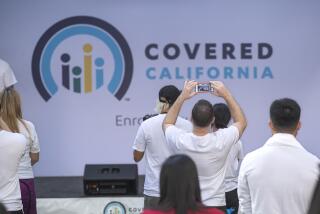COBRA subsidies begin expiring for the unemployed
Millions of unemployed Americans face the prospect of a huge increase in health insurance costs, thanks to the looming expiration of a government subsidy.
The American Recovery and Reinvestment Act, passed in February, launched a temporary government program to subsidize the often crippling cost of buying health insurance through a former employer’s plan after a layoff.
However, the so-called COBRA subsidy was designed to last no more than nine months for each person who was unemployed. Hundreds of thousands who got this subsidy when it was first made available in March are slated to roll off the program today.
The insurance subsidy will also no longer be available for Americans who lose their jobs starting today.
If the subsidy is not extended, hundreds of thousands will lose the subsidy each month, forcing them to pay health insurance premiums that are three times higher than what they’re currently paying.
The White House wants to extend the subsidies, an Obama administration spokeswoman said. And some Democratic lawmakers are pushing to include an extension in legislation that party leaders are developing to boost job growth.
But finding money for an extension remains a major challenge, especially at a time when Democrats are struggling to pay for their planned healthcare overhaul. The stimulus bill committed $25 billion for just nine months of COBRA subsidies.
And few believe that Congress will be able to pass a jobs bill before the end of the year, in large part because the Senate is locked in a debate on broader healthcare legislation. There is no indication yet of whether any extension would be retroactive, helping people who lose the subsidy.
COBRA, an acronym for the 1985 Consolidated Omnibus Budget Reconciliation Act that authorized the insurance, is generally more expensive than the premiums paid by company workers, and the new subsidy was intended to ease the burden.
Families USA, a Washington advocacy group, says COBRA insurance premiums would consume more than 83% of the average unemployment check without the subsidy, making it impossible for most families to afford continuing health insurance coverage.
In nine states, the average COBRA premium exceeds the average unemployment benefit, according to the Families USA analysis. “It’s hard to imagine that many people who are subsisting on an unemployment check will be able to keep coverage,” said Families USA Executive Director Ron Pollack.
In California, the consumer group estimated that the average monthly COBRA premium for a family plan is now about $1,107, or about 82% of the monthly unemployment benefit.
This subsidy program was launched to avert a huge increase in the ranks of the uninsured at a time of rapidly rising unemployment. It provides companies with government money to pay 65% of the health insurance premiums that would normally be shouldered by former workers who choose to continue their health coverage through COBRA.
COBRA is a federal law that allows laid-off employees to stay on their former employer’s group health insurance plan for up to 36 months. However, COBRA normally requires that these former employees pay the full cost of coverage, plus a small administrative fee, instead of the company-subsidized rates that most workers are accustomed to. That can make the premiums prohibitively expensive.
Only about 19% of laid-off workers typically opt for COBRA insurance, according to an analysis done by Hewitt Associates last summer. However, the now-expiring subsidy boosted COBRA enrollment rates to 38%, according to that analysis.
With unemployment continuing to rise -- some 15.7 million individuals were out of work as of October -- this subsidy may be a lifeline to health insurance for nearly 6 million workers.
Legislators in both the House and Senate have submitted proposals to extend the subsidy for six months, but the legislation has not yet cleared major committees nor been amended to fast-moving legislation, as would be required to extend the subsidy without a break.
Some experts suggest that the tenuous nature of the subsidy should spur those using it to come up with a contingency plan.
“You don’t want to have a false sense of security,” said Martin B. Rosen, co-founder of Health Advocate Inc. and co-author of “The Health Care Survival Guide.” “People need to prepare.”
Those who are healthy may be able to buy affordable coverage in the individual market, said Sam Gibbs, senior vice president of eHealthInsurance.com. The company, an online insurance broker, says that about half of its customers find family coverage for less than $350 per month and individual coverage for less than $150 per month.
A study by the Kaiser Family Foundation estimated that the average consumer on COBRA pays $398 per month for family coverage -- even after the government subsidy -- and pays roughly $144 per month for subsidized individual coverage.
It’s far worse for people with existing health issues. Individual coverage is often unaffordable -- or simply not available -- to those with preexisting medical conditions, he said. For these people, there is little option but to budget for the possibility of vastly higher premiums when the subsidy expires.
However, Rosen notes that there are a few other tricks consumers might employ -- such as trying to enroll in their spouse’s plan and looking for part-time work with companies that offer benefits to part-time workers, such as Starbucks, Costco and Trader Joe’s.
Additionally, some colleges that offer health insurance to students will allow parents to piggyback on their group plan, Rosen said. College coverage isn’t always ideal, but it can be better than nothing for those who can’t get insurance elsewhere, he added.
If a family is covered under COBRA, but only one person has a health issue, it’s also possible to keep that one person on COBRA, while shifting the rest of the family to less-expensive policies in the individual market, Gibbs said.
California also offers a state-subsidized high-risk pool for those who can’t get insurance elsewhere, but it cannot be tapped unless they have run out of COBRA eligibility and have no other option.
If all else fails, people can negotiate with their doctors when they have no health coverage, Rosen said. Many health professionals are willing to discount their rates for customers who lose their insurance.
“I went to the dentist and said, ‘I don’t have insurance anymore. I wonder if I could pay the [discounted] amount you’d normally get from the insurance company,’ ” Rosen said.
The dentist didn’t even blink, saying yes immediately, Rosen said. “That was not difficult, but people don’t even ask.”
Times staff writer Noam Levey in Washington contributed to this report.
More to Read
Get the L.A. Times Politics newsletter
Deeply reported insights into legislation, politics and policy from Sacramento, Washington and beyond. In your inbox three times per week.
You may occasionally receive promotional content from the Los Angeles Times.










